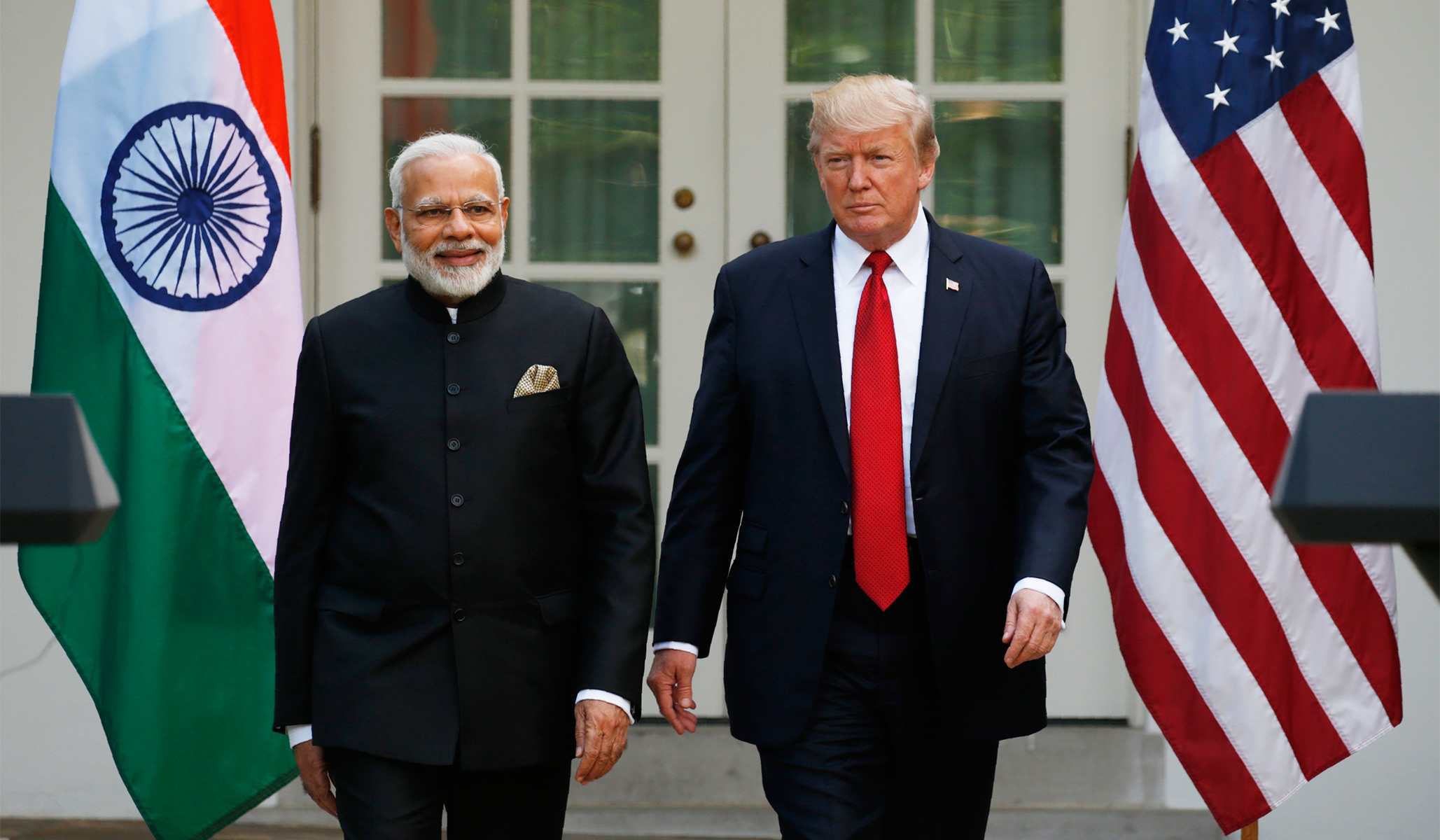

As the US presidential election approaches, one question on the minds of many is how a second Trump administration may impact India-US relations. With a focus on "America First" principles and a potential continuation of disruptive foreign policies, a renewed Trump presidency poses both opportunities and challenges for the strategic partnership between India and the US. Possible impacts on trade, immigration, and the Indian talent pool in the US are just a few areas to watch as the election results unfold.
India-US Relations: A Look at the Past and Potential Impacts of a Second Trump Administration
As the US presidential election approaches, the future of India-US relations has become a topic of significant discussion. With a focus on "America First" principles and a potential continuation of disruptive foreign policies, a renewed Trump presidency poses both opportunities and challenges for the strategic partnership between the two countries.
Background
India and the US have traditionally enjoyed strong diplomatic ties, with defense, trade, and shared democratic values as key pillars of their relationship. However, tensions emerged during the Trump administration, particularly over issues such as trade tariffs and immigration restrictions.
Potential Impacts of a Second Trump Administration
1. Trade: A second Trump administration could result in further trade disputes between India and the US. Trump has repeatedly criticized India's trade surplus with the US and has threatened to impose additional tariffs. This could potentially harm Indian exports and impact economic growth.
2. Immigration: Trump's immigration policies, including travel restrictions and reduced H-1B visas, have already affected the Indian talent pool in the US. A second Trump administration could further tighten immigration policies, limiting opportunities for highly skilled Indian workers.
3. Indo-Pacific Strategy: Trump's Indo-Pacific strategy has emphasized countering China's growing influence in the region. This could align with India's desire for greater security cooperation in the Indian Ocean. However, potential trade conflicts with China could have negative implications for India's economy.
4. Defense Cooperation: Trump has prioritized defense cooperation with India, particularly in the areas of arms sales and joint military exercises. A second Trump administration could further strengthen defense ties, enhancing India's capabilities against potential threats.
5. Climate Change: Trump's administration has withdrawn the US from the Paris Agreement on climate change. This could potentially create a rift between India and the US on this critical global issue, as India remains committed to the agreement.
Top 5 FAQs
1. What were the major tensions between India and the US during the Trump administration? Tariffs, immigration restrictions, and Trump's withdrawal from the Paris Agreement were key points of contention.
2. How could a second Trump administration impact trade between India and the US? Additional tariffs and trade disputes are possible, hindering Indian exports and economic growth.
3. What could be the effects of a second Trump administration on Indian immigrants in the US? Further restrictions on H-1B visas and travel limitations could reduce opportunities for Indian professionals.
4. How might a second Trump administration affect India's defense cooperation with the US? Increased arms sales and joint military exercises are likely, strengthening India's defense capabilities.
5. What are the potential implications of a Trump presidency on climate change cooperation between India and the US? Trump's withdrawal from the Paris Agreement could lead to differences between the two countries on this global issue.
Conclusion
The future of India-US relations under a second Trump administration remains uncertain. While there are potential opportunities for cooperation, there are also significant challenges that need to be carefully navigated. The outcome of the election will have a profound impact on the strategic partnership between the two countries, and it is crucial for both India and the US to work together to address common interests while mitigating potential frictions.

The government has approved the appointment of Supreme Court judge Justice Surya Kant as the next Chief Justice of India. He will take over from the incumbent CJI, Bhushan R Gavai, in November 2025 and will serve for 14 months. With an impressive career spanning over 37 years, Justice Kant has held various positions in the judiciary and legal service institutions. Let's take a closer look at his journey from a middle-class family in Haryana to the highest judicial post in India.

In a review meeting of the state's religious tourism projects, Chief Minister Mohan Yadav emphasized the need for balanced development in the pilgrimage town of Chitrakoot. He suggested that the Parikrama Path be developed before the construction of the Shri Ram Path Gaman to attract domestic and international tourists. Additionally, he stressed on the importance of crowd management during pilgrim festivals and the development of a wellness center for medical tourism in Chitrakoot.

In a recent social media post, Indian Prime Minister Narendra Modi praised the 'Statue of Unity' as a symbol of tribute to Sardar Patel and a testament to the power of a people's movement. The iconic statue, located at Kevadia in India, has been drawing visitors from all over the country, especially from rural areas, who feel a deep connection with its grandness. PM Modi urges everyone to visit Kevadia and experience the monument for themselves.

Prime Minister Narendra Modi's spontaneous gesture of walking and mingling with thousands of citizens, security personnel, and participants at the Ekta Parade ground in Gujarat highlights his deep reverence for Sardar Vallabhbhai Patel on the Iron Man's 150th birth anniversary. Dressed in his signature kurta, PM Modi paused to take selfies, exchange high-fives, and engage in conversations, eliciting cheers and chants of "Modi! Modi!" and "Bharat Mata Ki Jai!" from the diverse audience. This display of humility and national pride showcases PM Modi's commitment to Sardar Patel's dream of Ek Bharat, Shreshtha Bharat.

The nation comes together to remember and honor the life and legacy of Smt. Indira Gandhi, India's first and only woman Prime Minister, on the 41st anniversary of her martyrdom. Her courage, conviction, and unyielding spirit of service continue to inspire generations, as top leaders of the Congress offer floral tributes at Shakti Sthal in New Delhi. Congress leader Rahul Gandhi and CPP chairperson Sonia Gandhi remember their grandmother as a symbol of fearlessness, compassion, and unwavering commitment to the Indian people. Jairam Ramesh and Pawan Khera recount two pivotal moments in Indira Gandhi's political journey - her visit to Belchi and her meeting with opponent Jayaprakash Narayan - that cemented her place as a leading stateswoman.

On the 150th birth anniversary of Sardar Vallabhbhai Patel, Prime Minister Narendra Modi visited Gujarat and paid homage to the leader at the Statue of Unity. He also announced the release of a special coin and stamp in honor of Patel's contribution towards uniting India after independence. National Unity Day is observed every year on October 31 to remember Patel's crucial role in promoting national integration and unity in the country through his leadership and establishment of the All-India Services.

On the 150th birth anniversary of Sardar Vallabhbhai Patel, Prime Minister Narendra Modi paid tribute to the leader's contribution in uniting over 500 princely states. Addressing the Rashtriya Ekta Diwas celebrations in Gujarat, PM Modi emphasized the importance of 'Ek Bharat, Shreshtha Bharat' for Sardar Patel and praised his determination and hard work in making a united India a reality. The day also saw the release of a special commemorative coin and postage stamp in memory of the Iron Man of India.

On the 41st anniversary of her death, India reflects on the life and legacy of Indira Gandhi, the first and only female Prime Minister of the country. From her turbulent political journey to her bold reforms and enduring influence, Gandhi's impact on India's development and global position remains unparalleled. Despite facing challenges and controversy, she persevered and left a lasting mark on Indian politics and society.

As India celebrates National Unity Day on October 31, we remember Sardar Vallabhbhai Patel, the man who played a crucial role in bringing together the 562 princely states with the Union of India. Born in Gujarat on the same day in 1875, Patel's efforts, along with Vappala Pangunni Menon, ensured that most of these states merged with India. Despite facing challenges and resistance, Patel's determination and use of tactics such as introducing the concept of privy purse led to the successful integration of these states. We pay tribute to the legacy of Sardar Patel, known as the "Iron Man of India" on this occasion of National Unity Day.

On the 150th birth anniversary of Sardar Vallabhbhai Patel, known as the "Iron man of India", political leaders from across the country gather to pay tribute to his role in unifying India after Independence. Prime Minister Narendra Modi takes a pledge of unity at the Statue of Unity in Gujarat and announces a special commemorative coin and stamp as a tribute. President Droupadi Murmu also offers her greetings and describes Sardar Patel as a great patriot and nation-builder, urging citizens to unite and build a strong and harmonious India on National Unity Day.